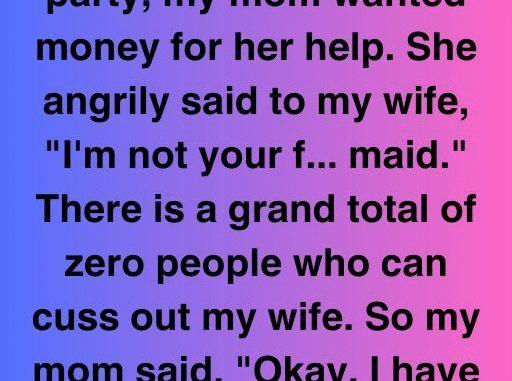
Our gender reveal party was supposed to be a day of joy—balloons, cake, and our closest friends and family gathered in the backyard. But when my mom snapped at my wife, Lara, calling her a word no one should ever use, everything shattered. She stormed out, slamming the door, leaving the party in stunned silence.
Lara tried to laugh it off, but I saw the pain in her eyes. That moment cut deep.
A History of Control
My mom had been difficult for weeks, turning party planning into a power trip—dictating the guest list, the cake flavor, everything—without ever asking us. Lara stayed quiet to keep the peace, but this? This was a new low.
After my mom left, the party limped on. We found out we were having a girl, but the celebration felt hollow. That night, Lara sat at the kitchen table, untouched cake between us, and whispered: “If this is how your mom will treat our daughter… I’m scared.”
That broke me.
A Cold Upbringing
I grew up with a cold, controlling mother. My dad left when I was six, and she raised me alone—two jobs, exhaustion, and a short temper. I respected her, but she never learned kindness. I hoped she’d soften as a grandmother. I was wrong.
After the party, I called her. No answer. Two days later, she texted: “Call me when your wife learns some respect.”
Silence.
The Twist No One Saw Coming
Weeks passed. Lara’s belly grew. We painted the nursery, bought a crib, and tried to move forward. Then, my Aunt Clara called:
“You need to talk to your mom.”
I scoffed. After what she’d done?
Then she dropped the bomb: “She’s been diagnosed with breast cancer.”
I sat down hard.
She’d known for months, gone to appointments alone, and started treatment next week. Her outburst at the party? Fear. She didn’t know how to ask for help.
A Fragile Reconciliation
That evening, I told Lara. She hugged me without a word, then said, “Let’s go see her.”
The next day, we showed up at my mom’s house. She looked frail, her curtains drawn. When she saw us, her eyes filled with shame.
“I’m sorry,” I said. “But you can’t ever talk to Lara like that again.”
She nodded, her voice barely a whisper: “I was scared. I didn’t want to feel weak.”
Lara stepped forward. “You’re strong. But pushing people away won’t help.”
For the first time in years, my mom looked vulnerable. Not angry. Not defensive. Just human.
Healing Old Wounds
Over the next few weeks, we visited more. I drove her to chemo. Lara brought homemade soup and sat with her during treatments. Slowly, my mom changed. She apologized to Lara—real tears, no force. She even admitted her mistakes:
“I was a bad mother. I did my best, but it wasn’t enough.”
I held her hand. Some wounds run too deep for words.
An Unexpected Reunion
Then came another twist.
At our daughter Eliza’s baptism, my dad showed up.
I hadn’t seen him in nearly twenty years. He stood in the back of the church, worn jacket, clutching daisies, looking older, softer.
“Your aunt told me about the baby,” he said. “I didn’t want to miss this.”
He didn’t beg for forgiveness. He didn’t overstay. He just left the flowers and said he was proud of me.
A week later, a letter arrived. Pages of regret, explaining why he left—his drinking, his depression, believing we’d be better off without him. Now four years sober, he worked in a warehouse, trying to rebuild his life.
I wrote back. Not ready for a full relationship, but open to the possibility.
A New Beginning
Six months later, my mom went into remission. She grew stronger, her laughter returning. One night, as Lara rocked Eliza, I heard my mom humming a lullaby—one I hadn’t heard since childhood.
That moment undid me.
The Lesson
People can change. Even when it seems impossible. Even after deep wounds.
We’re not perfect. My mom still gets bossy. My dad still sends awkward texts. But we’re building something new—something better.
Eliza will grow up surrounded by love—messy, honest love.
And for the first time, I don’t feel like I’m repeating my parents’ mistakes.
I feel like I’m fixing them.